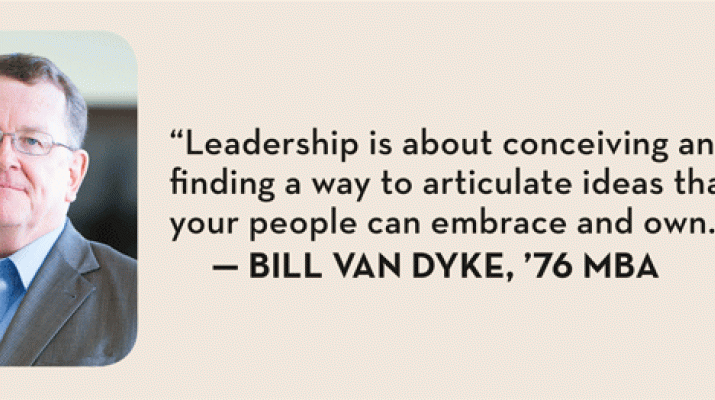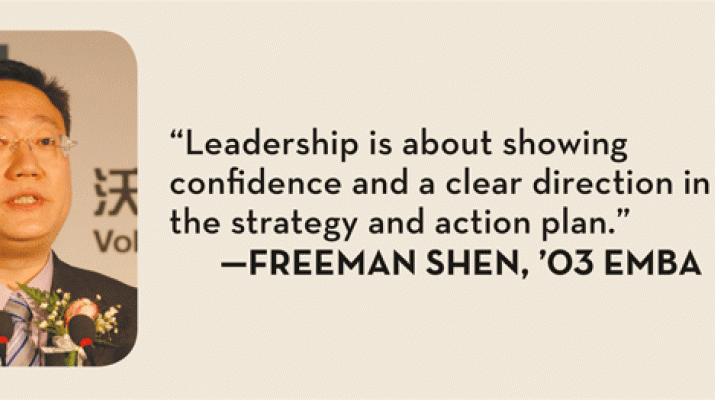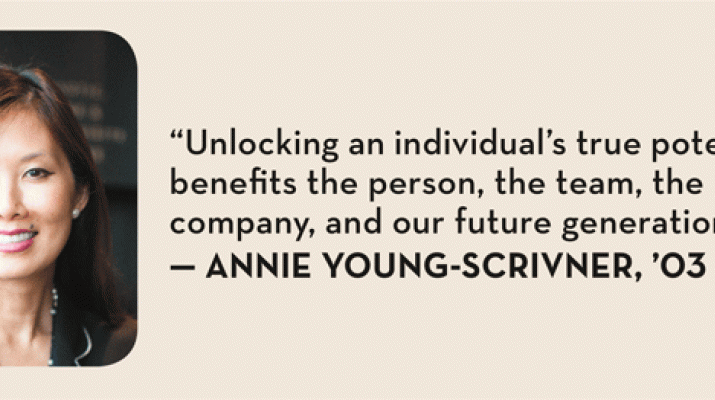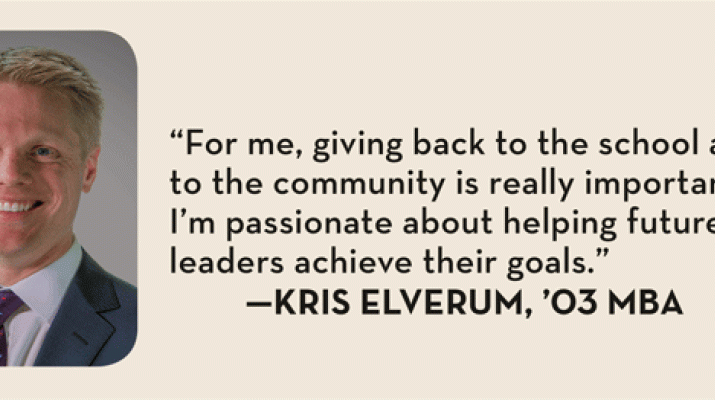
Alumni Redefining Leadership
Sunday, September 1, 2013
By Bridget Aymar
Great leaders possess a balanced combination of natural talent, deep knowledge, and strong intuition. But while it’s unclear whether leadership is a learned skill or an inherent strength, it’s clear some professionals have a knack for it. Meet the Carlson School alumni who apply their affinity for leadership toward growing profits and creating purpose across organizations.

There are always many approaches to how problems should be solved. While that makes for a very dynamic business, it’s also a challenge. Leadership to me is the ability to look at all these different stakeholders across the business and continue to drive MyRain forward in a cohesive manner so we can accomplish our goals.
Negotiating Conflicting Interests
Marketing and entrepreneurial management alumnus Steele Lorenz, ’10 BSB, is leading a social venture with global impact. With water scarcity fast becoming one of the most pressing environmental threats of the next decade, conserving water will be critical to the health of agriculture around the world. As CEO of MyRain, Lorenz is bringing drip irrigation technologies to small plot farms in India, increasing their efficiency and sustainability.
In the last year, Lorenz quit a digital retail consulting job and moved to Tamil Nadu, India, to launch MyRain. He and his team spent their first months in India learning about the local market, and then began marketing irrigation solutions aimed at increasing crop yields and conserving water. And the company is hitting its stride—in 2013, MyRain’s revenues grew 20 to 30 percent each month, as local small plot farmers embraced the technology.
In growing a new venture, Lorenz has discovered the importance of defining what the company is—and standing firm in what it isn’t. Choosing the best means for MyRain to deliver value is the toughest leadership issue the young CEO faces, as investors, employees, and customers all bring different ideas for how to achieve the company’s mission.
“There are always many approaches to how problems should be solved,” says Lorenz. “While that makes for a very dynamic business, it’s also a challenge. Leadership to me is the ability to look at all these different stakeholders across the business and continue to drive MyRain forward in a cohesive manner so we can accomplish our goals.”
When making these important choices, Lorenz focuses on the customer. He believes MyRain should meet a human need first, and generate revenue second. The Carlson School taught Lorenz how to marry these sorts of conflicting goals and address the concerns of stakeholders to come up with the best solution.
Lorenz and his team are examining how to apply new technologies to improve their offerings and boost efficiency for small plot farmers. And as MyRain grows, the CEO plans to empower employees to deliver on the company’s mission.
“Sometimes leadership is about organizing others,” he says. “If you have the right team, leadership is about focusing its creativity and energy towards a commonality.”

Leadership is about conceiving and finding a way to articulate ideas that your people can embrace and own.
Galvanizing Employees
Bill Van Dyke, ’76 MBA, retired from Donaldson Company in 2005, at the capstone of 15 consecutive years of double-digit earnings growth. Van Dyke began his career at a small company in St. Paul that was later acquired by Donaldson, a $2.5 billion global provider of filtration systems and parts. The Vietnam veteran turned MBA graduate spent 30 years moving up the ranks at Donaldson, rounding out his tenure as CFO; group vice president; and finally president, CEO, and chairman.
“Leadership is about conceiving and finding a way to articulate ideas that your people can embrace and own,” he says. “I was in the business of clarifying for our people how the interests of the shareholders and employees melded. When the employees come to understand that their long-term interests are aligned with those of the people who own the company, a lot of friction falls away.”
Van Dyke believes persistence takes precedent over perfection. It’s better to make decisions based on imperfect information, monitor the outcome, and correct course swiftly than to defer the decision while awaiting more facts.
“The Carlson School MBA taught me how to identify issues, how to think about choices, and how to make an orderly job of taking apart a messy problem, then dealing with the facts,” he says.
Today, Van Dyke is an invaluable supporter of the Carlson School and the University of Minnesota. He served on the school’s Board of Overseers from 1996 through last year (chairing the group for three years), and was a member of the committees that selected Carlson School Dean Sri Zaheer.
Recently, Van Dyke has championed a $7.7 million fund to enable military veterans to earn an MBA. As a vet and MBA grad, he believes the maturity and drive that a significant contingent of veterans brings to the classroom will strengthen the Carlson School, while the MBA program can instill in veterans the language of business.
“I have always believed the University of Minnesota, particularly the business school, is an important factor in the success of the Twin Cities,” he says. “I think individuals, businesses, and organizations are responsible for ensuring that this institution continues to grow and thrive.”

Leadership is about showing confidence and a clear direction in the strategy and action plan.
Heading Employees' Insights
Alumnus Freeman Shen, ’03 EMBA, wears three hats: he is group vice president of Geely Holding Group, chairman and CEO of Shanghai Geely Zhaoyuan International, and chairman of the Volvo Car Group China. In 2009, he led Geely’s acquisition of Volvo. The move positioned Geely Group, a company founded only 18 years prior, as a major player in the global automotive industry.
To carry out the massive acquisition, Shen led a team of 20 professionals who hailed from the United States, Canada, Sweden, Belgium, and China. An international business leader himself, Shen has worked in the United States, Europe, and Asia. And in creating harmony among the diverse team, he has adopted a leadership approach in stark contrast with typical Chinese business practices.
“I’m very open to hearing new and different ideas,” says Shen. “I always welcome challenges from my fellow team members. I’m not a typical Eastern manager in that way. In Asian cultures, leaders typically use the top-down approach. I prefer to listen to people from across the organization, then make a decision.”
Shen believes his propensity to elicit insights from all corners of the company leads to confident decisions and solid strategy. He says when employees get the opportunity to contribute their ideas, they’re more likely to buy into a new plan.
“Leadership is about showing confidence and a clear direction in the strategy and action plan,” he says. “You have to ensure your team fully buys in, and they’re willing to be part of your process to reach the target. It’s not easy, but it’s essential.”
The alum reflects on his time at the Carlson School as his greatest opportunity to read, think, and take part in spirited discussion—a process most professionals have little time for.
“When I began my MBA, it was a critical time for me to move from middle management to a more senior level,” he says. “Even after 10 years, I still remember plenty of what I learned.”

Unlocking an individual's true potential benefits the person, the team, the company, and our future generations.
Developing Diverse Talent
Annie Young-Scrivner, ’03 MBA and president of Starbucks Canada, has worked in 27 countries throughout her career. Her duties with Starbucks include creating complementary teams across international boundaries, advising fellow executives on global operations, and securing the resources to support the company’s local agendas throughout the world. Her enthusiasm for negotiating differences to lead change has helped Starbucks continue its growth as a global brand.
Young-Scrivner subscribes to Starbucks’ longstanding belief that developing talent leads to long-term success. After 20 years learning under strong leaders, she embodies leadership by creating a culture where employees can be their best at work and are committed to continuously improve.
“For me there is nothing more rewarding than the development of talent. I enjoy bringing the best out of people, and I thrive on elevating the status quo,” she says. “Unlocking an individual’s true potential benefits the person, the team, the company, and our future generations.”
The Carlson School’s Executive MBA program, designed for highly experienced professionals, connected Young-Scrivner to lifelong colleagues and contacts. More importantly, it instilled the confidence she needed to take her career to the next level.
“I think we are all leaders, regardless of our roles, and everyone has the ability to influence and positively impact others,” she says.

For me, giving back to the school and to the community is really important. I'm passionate about helping future leaders achieve their goals.
Guiding Continual Change
To compete in a global market, organizations must anticipate and negotiate constant change. As the global head of strategy for Munich-based Sandoz, the world’s second-largest manufacturer of generic pharmaceuticals, Kris Elverum, ’03 MBA, leads the corporation through ceaseless change.
Elverum accounts for a range of factors, all in constant shift, when developing a strategic plan. He considers how the pharmaceutical market is behaving, what products the customer is demanding, which products and geographies are growing, and where threats from competitors might arise. And for a corporation that generates more than $9 billion in annual revenue, employs 25,000 people, and operates in 130 countries, these insights create continual change throughout Sandoz.
“The nature of my role is to lead the beginning of what will become very significant changes,” says Elverum.
Elverum identifies strong leaders by their ability to achieve goals during tumultuous times when the future is less than certain and to foster the professional growth of employees. He is both challenged and rewarded by leading a team of high-performing professionals and dedicates considerable time to coaching, teaching, and motivating teams throughout the organization.
“Leadership is about getting more out of people than they would have otherwise gotten out of themselves,” he says. “And that sometimes means pushing people to do more than they think they can do. I think being able to encourage and inspire, while at the same time being demanding, is a balance that great leaders get right.”
The Carlson School taught Elverum the importance of mentorship and professional development, both through higher education and beyond.
“A lot of people helped me obtain the position I have today,” he says. “For me, giving back to the school and to the community is really important. I’m passionate about helping future leaders achieve their goals.”